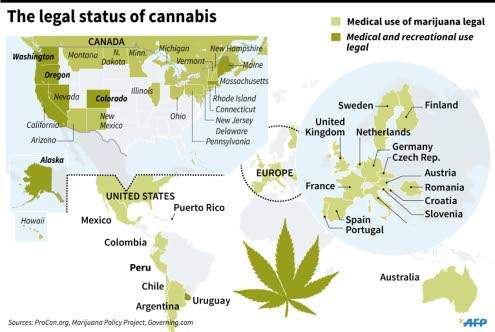Cannabis, known locally as ganja, originated as a remedial herb and gained prominence in ancient medicine for centuries.
Despite its extensive history, for decades it has been classified as a dangerous drug in the eyes of international regulatory bodies and legislation. This includes the United Nations (UN) and World Health Organization (WHO), where cannabis is characterised as a narcotic drug in the three major drug control conventions:
• The Single Convention on Narcotic Drugs of 1961
• The Convention on Psychotropic Substances of 1971
• The United Nations Convention against Illicit Traffic in Narcotic Drugs and Psychotropic Substances of 1988.

Cannabis was also declared a Schedule 1 drug in 1970 under the US Controlled Substances Act, which classifies it as having no currently accepted medicinal use and a high potential for abuse. However, with advocacy for the plant at its highest, the legal statutes surrounding cannabis are undergoing major changes in favour of loosening restrictions globally.
With progress steadily taking place overseas, what are the laws that have been implemented to govern cannabis in Jamaica?

The first steps taken by the Government to deliberate the decriminalisation of cannabis included a national commission conducted in 2000 that was led by Professor Barry Chevannes, then dean of the Faculty of Social Sciences at The University of the West Indies.
The results were then shared in a 2001 report that showed public support for the decriminalisation of cannabis for private use. However, this sentiment did not translate into legal reform until 2015, under the amended Dangerous Drugs Act.
So What Do You Need to Know?
Possession and Cultivation
• Possession of two ounces or less of cannabis will no longer be considered an offence for which a person can be arrested, charged and tried in court and it will not result in a criminal record.
• The possession of cannabis for medicinal purposes is authorised once prescribed by a licensed health professional and for scientific research by an institution of higher education.
• Each household is allowed to legally cultivate up to five cannabis plants on its premises. If there is more than one household on any premises, each household may grow five ganja plants.
• Smoking of cannabis in a public place or within five metres of a public place is prohibited. However, smoking of cannabis is legally permitted in places that are licensed to allow smoking for medical or therapeutic purposes.
Sacramental Purposes
• Adherents to the Rastafarian faith are also permitted to smoke cannabis for sacramental purposes in locations registered as places of Rastafarian worship.
• People 18 years or older who are adherents to the Rastafarian faith, or Rastafarian organisations may apply for authorisation to cultivate cannabis for religious purposes as a sacrament, in adherence to the Rastafarian faith.
It is important to note the position of the Ministry of Health on the use of cannabis, which is confined to medicinal use and not recreational use. The ministry also does not encourage the smoking of cannabis, even for medical use, as this method is considered a health hazard.
With regard to the different methods of consumption, the Ministry of Health encourages the use of topical solutions, oral administrations as well as ingestion, such as capsules made from extracts of cannabis. However, the use of edibles is excluded in any form.
Who are the Regulatory Bodies?
The Cannabis Licensing Authority (CLA) was established in 2015 and operates independently of the Ministry of Health. The CLA focuses on the growth, development and orderly regulation of a legal cannabis and hemp industry in Jamaica geared towards medical, therapeutic, and scientific purposes.
The CLA also issues licences and permits for the handling of cannabis, including the cultivation, transportation, processing and retail of cannabis-derived products for medical, scientific and therapeutic purposes. However, it does not have jurisdiction over religious use, with the Ministry of Justice overseeing this area of responsibility.
Under the Ministry of Health, the Medicinal Cannabis Unit (MCU) was established to enforce the amendments made in the Dangerous Drugs Act of 2015 and to oversee the implementation of medicinal cannabis regulations and guidelines.
The MCU is responsible for the registration and regulation of all cannabis and cannabis-related products (including hemp) as well as cannabis products for medicinal use — whether produced locally or internationally.
This covers all derivatives with less than one per cent THC (tetrahydrocannabinol), — which are pharmaceutically acceptable, rather than the plant material.
THC is the chemical responsible for most of marijuana’s psychological effects.











